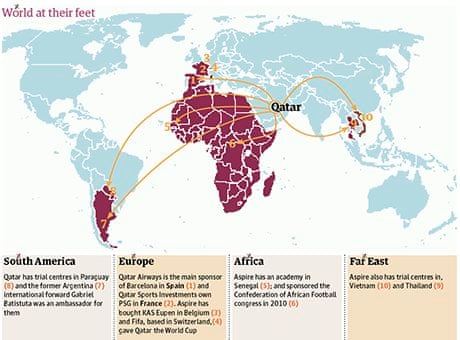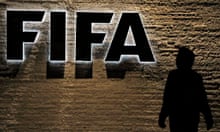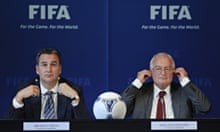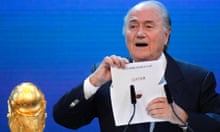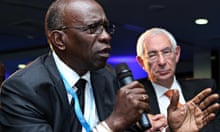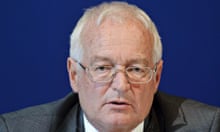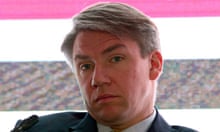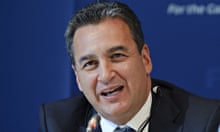Deep into the now dishearteningly familiar report of serial abuses to which Qatar subjects its battalions of migrant construction workers, Amnesty International issues a sharp and direct challenge: "The outside world will judge," the report says, "whether the World Cup has been built on forced labour and other exploitation."
From football, apart from the Fifa president Sepp Blatter's equivocations as to whether he recognises any responsibility at all for workers' rights, there has been near-silence about the conditions of workers who will build the stadiums, hotels and other structures for the 2022 World Cup.
This is in part due to football's habitual difficulty negotiating real life when it presses too close to the game's dream factory. In part, though, it reflects the extraordinary influence now wielded over the world's most popular sport by this tiny Gulf state of two million people, sticking out of Saudi Arabia on land described in the CIA factbook as "slightly smaller than Connecticut".
Almost unknown and unnoticed in football until its World Cup bid grew formidable, Qatar, the richest country in the world by GDP, at $103,900 per head, has now spread its name across the globe partly through colonising the game. In 2011 the Qatar Foundation paid €150m for a five-year deal to become the first ever sponsor of the Barcelona shirt, arguably the world's most prestigious advertising space. Just two years into that odd arrangement, by which the country's charitable arm was paying to sponsor a football club, the deal was converted into Barcelona's first genuinely corporate sponsorship.
Announcing Qatar Airways' agreement to pay €96m for a three-year deal, Javier Faus, Barcelona's vice-president for economy and strategy, said that for the money, Qatar Airways would get its name not only on to the players' chests but on the Camp Nou facade, on the iconic stadium's seats, next to the Nike logo, and: "There will be a space for them in the museum."
Qatar Airways' executive director, Akbar al-Baker, said of the deal with the club which had always previously stood apart, a member-owned institution representing Catalan regional pride: "We share values, ambitions, courage and excellence with FC Barcelona."
Qatar's wealth, generated by a $183bn GDP (in 2012) drawn mostly from natural gas, bought Paris St-Germain, in May 2011. That acquisition, by the state-owned Qatar Sports Investments, followed a lunch the previous year at the Elysée Palace shared by the French president, Nicolas Sarkozy, Michel Platini, the French president of Uefa, Tamim bin Hamad al-Thani, who has since succeeded his father Hamad as the country's emir, and the Qatari prime minister.
Platini has acknowledged that Sarkozy wanted the Qataris to buy PSG and Platini to vote Qatar in Fifa's 2010 World Cup decision but denies that his president's urging influenced his vote. Platini's son, Laurent, was subsequently offered the job as chief executive of Burrda, the QSI-owned sports clothing company, which Platini says is completely unconnected to him voting for Qatar.
PSG's chances of competing at elite European level and paying the galactic wages of Zlatan Ibrahimovic, Edinson Cavani and other top-rank signings were fuelled by this summer's startling deal, in which the Qatar Tourism Authority will pay up to €200m a year as a sponsor, for four years, reportedly backdated to start in 2012.
The emir, and the country itself, have never explained the thinking which truly lies behind this frantic interest in football. The country's national sports sector strategy 2011-2016 draws on the Qatar development plan to 2030 to claim: "The principles for Qatar's sustainable and balanced development [are] based on a vibrant and prosperous economy that provides economic and social justice, stability and equal opportunity for all."
Many observers agree that Qatar's strategy is part aspirational, rapidly to build western-friendly foundations for a post-gas modern economy, and part defensive, to make a noise big enough to transcend Saudi Arabia's looming shadow.
The softer part of Qatar's football influence is spread by the Aspire academy, an extraordinary talent-spotting programme which claims to assess 400,000 young footballers a year across Africa, Asia and Latin America. Promising young players are scrutinised at centres throughout Africa, and in Paraguay, Thailand and Vietnam. Paraguay and Thailand are the home territories of the influential former Fifa executive committee member Nicolás Leoz and serving exco member Worawi Makudi, but Aspire denies the locations are linked to World Cup voting. The best two players from each country are selected to be trained at an Aspire academy, in Senegal.
Last year Aspire bought a club in the Belgian second division, KAS Eupen, which is being used to give first-team senior experience to promising graduates from the Senegal and Doha academies. The quality of the Aspire facilities attracts leading clubs and their academies, including Manchester United, Bayern Munich, Everton and Liverpool in recent years, to go to Doha for warm weather training or to compete in junior competitions.
From the beginning the "Aspire football dreams" project has been viewed by some as a global recruiting operation for overseas players who will be given citizenship and play in the Qatari national team but Aspire's director general, Ivan Bravo, formerly Real Madrid's director of strategy, denies it. Aspire claims the programme is pure social responsibility, helping to improve the life chances of young people in poor parts of the world.
That noble mission rather clashes with the treatment of migrant workers building Qatar itself, and Fifa's headquarters and VIP centre in Doha, one of whom complained to the Amnesty researchers: "Nepalis are treated like cattle." Yet so far the football world, and ambassadors for Qatar's World Cup bid including Pep Guardiola, Zinedine Zidane and Gabriel Batistuta, and for Aspire, Lionel Messi, left, and Pelé, do not appear uneasy.
The bid for 2022, won in that feverish vote of Fifa's exco in 2010, was the fruition of Qatar's bold effort to make itself known: nation-building through football, with money and on a scale unprecedented.
